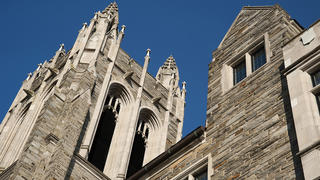Office of Teaching and Learning to host Open Classrooms
Saint Joseph's Office of Teaching and Learning (OTL) will host its second annual Open Classrooms event March 5-7. The program’s founder, Usha Rao, Ph.D., associate professor of environmental chemistry and director of the OTL hopes the event will foster reflection and campus-wide conversations about teaching, and encourage the adoption of practices that enhance student learning.

The Office of Teaching and Learning (OTL) at Saint Joseph’s University will host its second annual Open Classrooms event March 5-7. The program’s founder, Usha Rao, Ph.D., associate professor of environmental chemistry and director of the OTL hopes the event will foster reflection and campus-wide conversations about teaching, and encourage the adoption of practices that enhance student learning.
Open Classrooms is an open house for teaching, designed for faculty to learn about a diversity of educational approaches and styles used by campus colleagues and to create an active and public discourse around pedagogy. The event will open the doors to different classroom experiences offered by 25 faculty members for their peers and other campus guests to visit and observe their colleagues’ best practices. For instance, a molecular geneticist might attend a course taught by a business policy instructor, and vice versa.
Elizabeth Becker, Ph.D., assistant professor of psychology, participated in last year’s Open Classrooms and plans to do so again this year. “Transformative teaching is like art or sport: It must be studied, practiced and shared,” says Becker. “I am thankful to those faculty members who opened their classrooms last year because it provided me a unique opportunity to see different styles and perspectives that I can assimilate into my own teaching pedagogy.”
Rao says that Open Classrooms, along with the rest of OTL’s robust schedule of faculty-driven seminars, workshops and resources, supports both new and established faculty members in delivering effective, exceptional teaching to SJU students. She shares her thoughts on the Open Classrooms experience and how it benefits faculty and students below.
Why is this event important for SJU's faculty and students alike?
Open Classrooms is an opportunity for faculty to learn about the interesting and innovative teaching approaches and styles our colleagues are using, and students’ collective learning experience at SJU.
Teachers rarely get to learn about others’ pedagogical experiences since teaching takes place behind closed doors. This is an attempt to open up the process and create a campus culture where we are all teaching, learning, and innovating in a collaborative and mutually supportive fashion. It can be hard at first to make yourself vulnerable to having visitors in the classroom, but I think the rewards are well worth the effort.
If we seek to transform our students’ learning, and lives in a meaningful way, we as faculty members must continue to push ourselves to bring our best and most engaged selves into the classroom every day.
What initially inspired you to develop Open Classrooms?
It started with a conversation with my colleague Jeffery Hyson, Ph.D., assistant professor of history, who mentioned that we, as a faculty, lacked sufficient opportunities to visit each other’s classes outside of the tenure and promotion review process. He directed me to a program at Rice University that offers open houses for teaching, and I remembered a similar program at the University of Massachusetts-Amherst.
After studying those programs, I felt that something along those lines would work well at SJU: Teaching and learning are central to our mission, and many of the faculty here are deeply committed to perfecting the art of teaching.
What kind of response have you received from participating professors?
Faculty loved the opportunity to interact with colleagues across divisional and departmental silos, and to talk about what we are all so passionate about at SJU: teaching. Interestingly, faculty members have noted that even if the teaching approach they observed didn’t translate easily to their own class or discipline, the very act of participating in classroom observation of others fostered the germination of new ideas and approaches to take back to their own teaching and students.
Are there any features to this new event that were not available last spring?
I am experimenting with a more targeted approach this year, with fewer days (three instead of five), to create a tightly focused event. We have about 25 faculty members offering 31 courses and 46 sections for visitors to attend. These include undergraduate and graduate courses, traditional and online offerings, and cover a range that includes general education courses to upper-level courses in fields like biochemistry.
